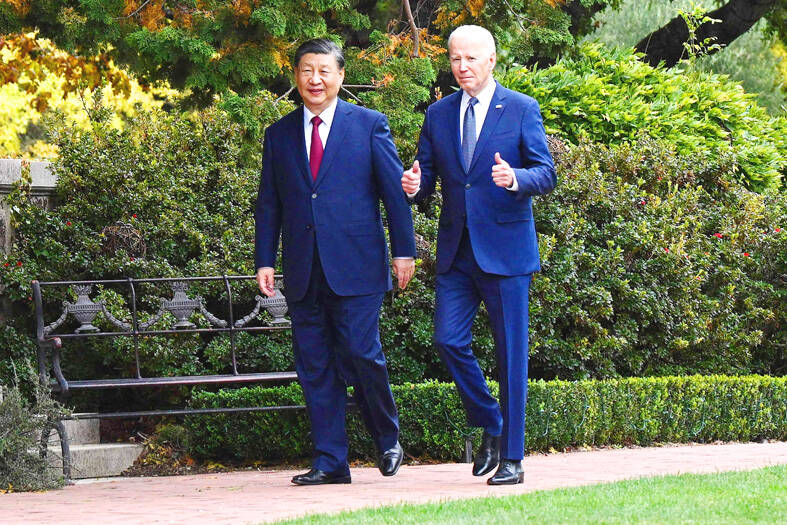US President Joe Biden’s teleconference with Chinese President Xi Jinping (習近平) this week was part of a crisis management strategy and should not be taken as a sign of easing tensions, an academic said yesterday.
The timing of the call on Tuesday US time was not a coincidence, as it took place while American Institute in Taiwan Chair Laura Rosenberger was visiting Taiwan, said Kuo Yu-jen (郭育仁), a professor at the Institute of China and Asia-Pacific Studies at National Sun Yat-sen University.
Biden and Xi “held a candid and constructive discussion on a range of bilateral, regional and global issues, including areas of cooperation and areas of difference,” the White House said in a statement.

Photo: AFP
“President Biden emphasized the importance of maintaining peace and stability across the Taiwan Strait and the rule of law and freedom of navigation in the South China Sea,” it added.
The two leaders’ call and their in-person meeting at APEC in November last year suggest that risk management has become the new paradigm in the bilateral relationship, Kuo said.
The continued conversations between the two leaders indicate Beijing’s acceptance of the US-proposed “guardrails” to de-risk a volatile situation, not movement toward reconciliation, he said.
The reason for Xi’s willingness to engage in cooperation is the unfavorable turn of geopolitics and a surge in uncertainty beginning in the latter half of last year, Kuo said.
Escalation in the Israel-Hamas war, Russia’s interjection into the standoff in the Korean Peninsula, China-Philippines confrontations in the South China Sea and former US president Donald Trump’s resurgence are among the factors that encouraged the two sides to manage risks together, he said.
Managing the potential for conflict in the Taiwan Strait is a key part of the two sides’ strategy of derisking, Kuo said.
Biden’s approach has been a double strategy to restrain Taiwan from provoking Beijing while warning China that there would be consequences for rash actions, he said.
The US model of managing the Taiwan Strait can be seen in action following Vice President William Lai’s (賴清德) election victory, as Washington reiterated its opposition to Taiwanese independence, while Beijing refrained from taking overly dramatic action, he said.
This explains Biden’s decision to use the hotline to call China and send Rosenberger to Taiwan at the same time, Kuo added.
This is not the only time Biden arranged a China interaction at the same time as a friendly gesture to Taiwan, he said.
Biden called Xi for the first time on Feb. 10, 2021, the day then-representative to the US Hsiao Bi-khim (蕭美琴) met with Sung Kim, then-acting US assistant secretary of state for East Asian and Pacific affairs, Kuo said.
Similarly, US Secretary of State Antony Blinken openly accused China of giving arms to aid Russia’s invasion of Ukraine right before Biden’s talk with Xi on March 18, 2022, he said.
The two leaders spoke again in July that year, a month before then-US House of Representatives speaker Nancy Pelosi visited Taiwan, he said.

An essay competition jointly organized by a local writing society and a publisher affiliated with the Chinese Communist Party (CCP) might have contravened the Act Governing Relations Between the People of the Taiwan Area and the Mainland Area (臺灣地區與大陸地區人民關係條例), the Mainland Affairs Council (MAC) said on Thursday. “In this case, the partner organization is clearly an agency under the CCP’s Fujian Provincial Committee,” MAC Deputy Minister and spokesperson Liang Wen-chieh (梁文傑) said at a news briefing in Taipei. “It also involves bringing Taiwanese students to China with all-expenses-paid arrangements to attend award ceremonies and camps,” Liang said. Those two “characteristics” are typically sufficient

A magnitude 5.9 earthquake that struck about 33km off the coast of Hualien City was the "main shock" in a series of quakes in the area, with aftershocks expected over the next three days, the Central Weather Administration (CWA) said yesterday. Prior to the magnitude 5.9 quake shaking most of Taiwan at 6:53pm yesterday, six other earthquakes stronger than a magnitude of 4, starting with a magnitude 5.5 quake at 6:09pm, occurred in the area. CWA Seismological Center Director Wu Chien-fu (吳健富) confirmed that the quakes were all part of the same series and that the magnitude 5.5 temblor was

The brilliant blue waters, thick foliage and bucolic atmosphere on this seemingly idyllic archipelago deep in the Pacific Ocean belie the key role it now plays in a titanic geopolitical struggle. Palau is again on the front line as China, and the US and its allies prepare their forces in an intensifying contest for control over the Asia-Pacific region. The democratic nation of just 17,000 people hosts US-controlled airstrips and soon-to-be-completed radar installations that the US military describes as “critical” to monitoring vast swathes of water and airspace. It is also a key piece of the second island chain, a string of

The Central Weather Administration has issued a heat alert for southeastern Taiwan, warning of temperatures as high as 36°C today, while alerting some coastal areas of strong winds later in the day. Kaohsiung’s Neimen District (內門) and Pingtung County’s Neipu Township (內埔) are under an orange heat alert, which warns of temperatures as high as 36°C for three consecutive days, the CWA said, citing southwest winds. The heat would also extend to Tainan’s Nansi (楠西) and Yujing (玉井) districts, as well as Pingtung’s Gaoshu (高樹), Yanpu (鹽埔) and Majia (瑪家) townships, it said, forecasting highs of up to 36°C in those areas